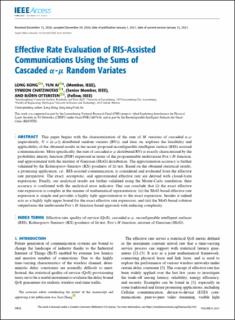Effective Rate Evaluation of RIS-Assisted Communications Using the Sums of Cascaded α-μ Random Variates
Peer reviewed, Journal article
Published version

View/
Date
2021Metadata
Show full item recordCollections
Abstract
This paper begins with the characterization of the sum of M versions of cascaded α-μ (equivalently, N*(α-μ)) distributed random variates (RVs), and later on, explores the feasibility and applicability of the obtained results in the recent proposed reconfigurable intelligent surface (RIS)-assisted communications. More specifically, the sum of cascaded α-μ distributed RVs is exactly characterized by the probability density function (PDF) expressed in terms of the programmable multivariate Fox’s H-function, and approximated with the mixture of Gaussian (MoG) distribution. The approximation accuracy is further validated by the Kolmogorov-Smirnov (KS) goodness of fit test. Based on the obtained statistical results, a promising application, i.e., RIS-assisted communication, is considered and evaluated from the effective rate perspective. The exact, asymptotic, and approximated effective rate are derived with closed-form expressions. Finally, our analytical results are further validated using the Monte-Carlo simulation, their accuracy is confirmed with the analytical error indicator. One can conclude that (i) the exact effective rate expression is complex in the manner of mathematical representation; (ii) the MoG-based effective rate expression is simple and provides a highly tight approximation to the exact expression, besides it indeed acts as a highly tight upper bound for the exact effective rate expression; and (iii) the MoG-based solution outperforms the multivariate Fox’s H-function based approach with reducing complexity.
